Two conversations with Bruce Duffie
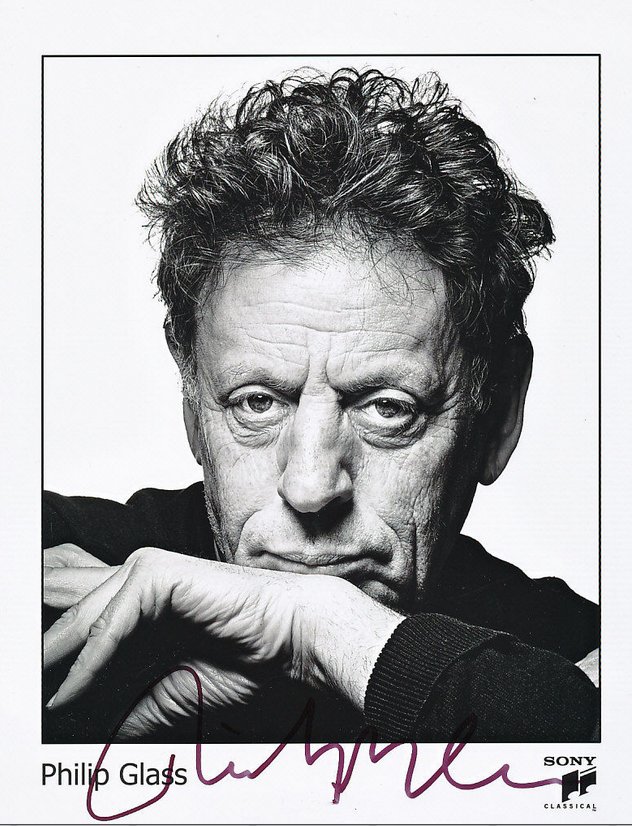

Born on January 31, 1937 in Baltimore, Maryland, Philip Glass worked in his father's radio store and discovered music listening to the offbeat Western classical records customers didn't seem to want. He studied the violin and flute, and obtained early admission to the University of Chicago. After graduating in mathematics and philosophy, he went to New York's Julliard school, drove a cab, and studied composition with Darius Milhaud and others. At 23, he moved to Paris to study under the legendary Nadia Boulanger, who taught almost all of the major Western classical composers of the 20th century. While there, he discovered Indian classical music while transcribing the works of Ravi Shankar into Western musical notation for a French filmmaker. A creative turning point, Glass researched non-Western music in India and parts of Africa, and applied the techniques to his own composition. Back in the United States, Glass spent the late 1960s and early 1970s driving a taxi cab in New York and creating a major collection of new music. In 1976, his landmark opera "Einstein on the Beach" was staged by Robert Wilson to a baffling variety of reviews. His compositions were so avant-garde that he had to form the Philip Glass Ensemble [shown in photo below] to give them a venue for performance. Although called a minimalist by the Western classical mainstream, he denies this categorization. His major works include opera, theater pieces, dance, and song. 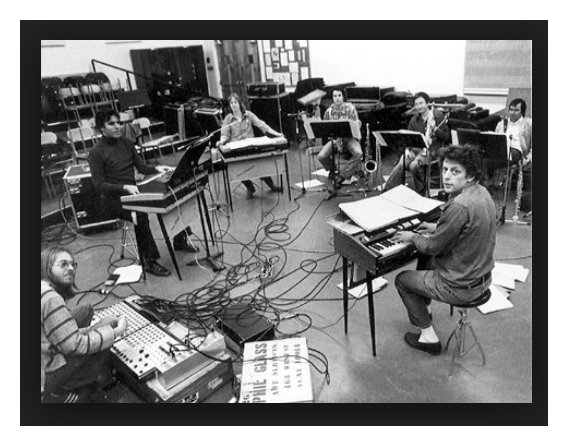
His work in film, beginning with Koyaanisqatsi (1982), gave filmmakers such as Godfrey Reggio and Errol Morris a new venue of expression through the documentary form. His many recordings have also widened his audience. He was commissioned by the Metropolitan Opera to compose "The Voyage" for the Columbus quinquacentennial in 1992. In 1996, he composed original music for the Atlanta Olympic Games, which, perhaps, made Glass almost mainstream. Glass remains one of the most important American composers. His music is distinctive, haunting, and evocative. Either performed by itself or in collaboration with other media, his compositions move the listener to unexplored places. More recently, a major reexamination of Glass's oeuvre has led him to be labeled the Last Romantic by the musical press. -- IMDb Mini Biography by Jim Sadur
[text only - photo from another source]
-- Throughout this page, names which are links refer to my Interviews elsewhere on this website. BD |
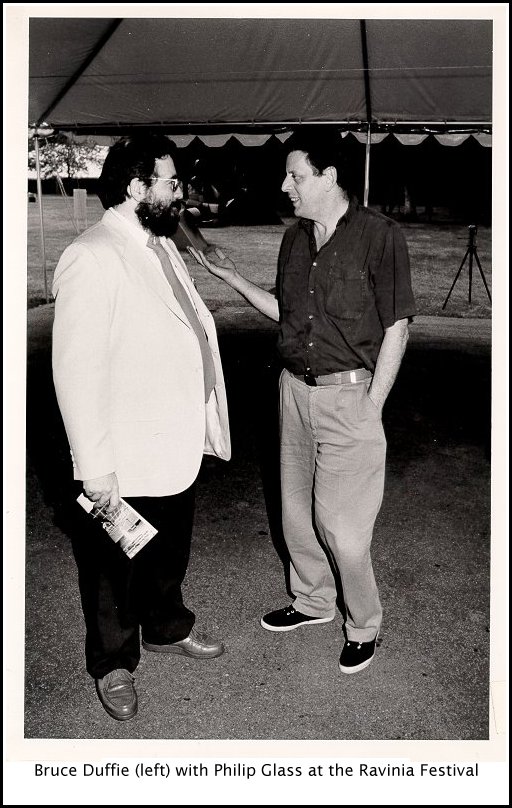 BD: Your most recent opera is Satyagraha?
BD: Your most recent opera is Satyagraha?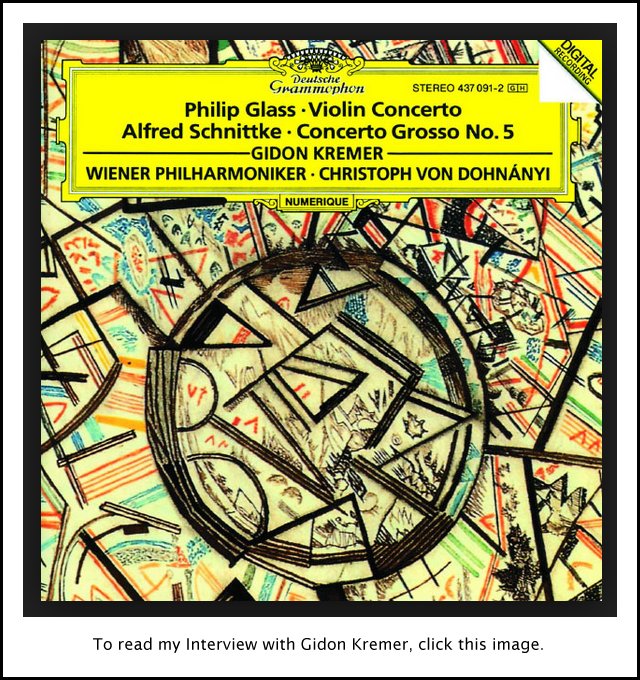 PG: Yes. That’ll be in ‘84 in Stuttgart,
and I think it’ll be at the Houston Grand Opera in this country. We’re
talking about it. They’re very interested in doing it, and we’re interested
in them doing it. The point about these operas is that I began with
personages, with characters, and I built around those characters, taking events
from their lives. So I didn’t really work in a conventional way.
There are plenty of people interested in this kind of opera. The two
operas that I’ve written — Einstein and Satyagraha — I
could say that neither opera has ever played to an empty seat. They’ve
always been sold out. That’s quite an accomplishment! [Indeed, these works are universally known enough
for Peter Schickele
(as PDQ Bach) to have written a parody called Einstein on the Fritz.]
PG: Yes. That’ll be in ‘84 in Stuttgart,
and I think it’ll be at the Houston Grand Opera in this country. We’re
talking about it. They’re very interested in doing it, and we’re interested
in them doing it. The point about these operas is that I began with
personages, with characters, and I built around those characters, taking events
from their lives. So I didn’t really work in a conventional way.
There are plenty of people interested in this kind of opera. The two
operas that I’ve written — Einstein and Satyagraha — I
could say that neither opera has ever played to an empty seat. They’ve
always been sold out. That’s quite an accomplishment! [Indeed, these works are universally known enough
for Peter Schickele
(as PDQ Bach) to have written a parody called Einstein on the Fritz.] 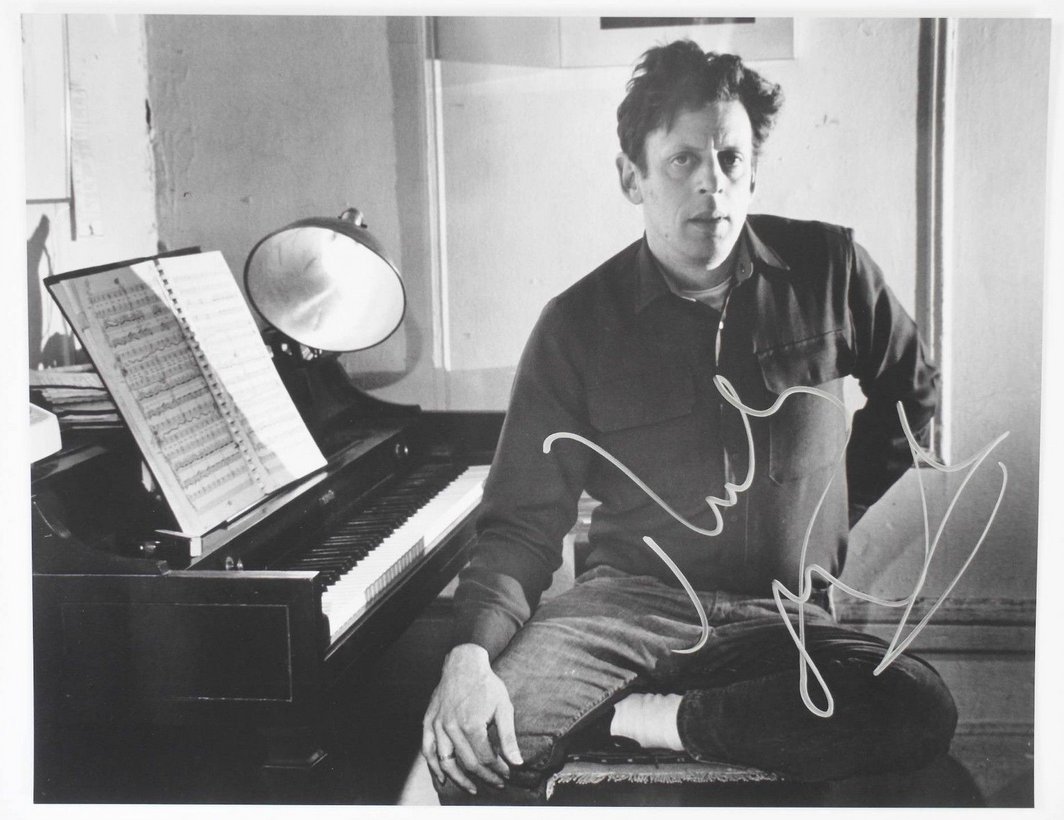
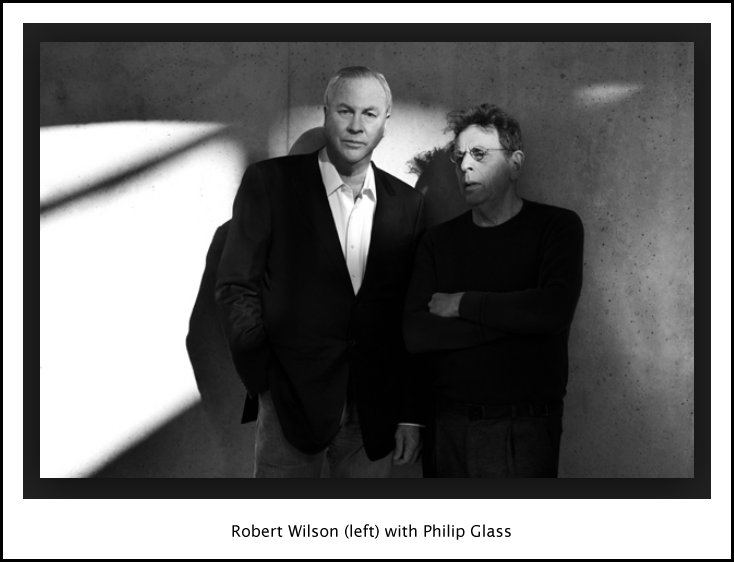 PG: Even though I’m not doing music like Einstein or Satyagraha right now, I am very tuned
in to the actual process of making a piece. Here’s another difference
between music theater and traditional opera. These kinds of works tend
to be composite works that usually involve joint authorship. Now, Verdi,
Puccini, Mozart or whoever, no one stated that they hired a librettist or
engaged a writer. Nevertheless, those were the visions of those particular
people. No so true of Da Ponte, perhaps. It’s arguable, but when
we think of a Verdi opera, it’s the vision of that man. When Bob Wilson
and I did Einstein on the Beach,
it was a shared work. I just finished a work with Doris Lessing called
Making the Representative for Planet 8,
based on one of her books. We worked with a designer, Eiko Ishioka.
We worked through the process of making the work. When I did Satyagraha, I worked with Bob Israel,
whose designs we’re seeing here in Chicago. David Pountney was involved
in those early stages in the work, and the creation of the work — we use that
word — was really result of our working together. In a way, I became
rather like the leader of a creative team with associated authors. That’s
really the way it works, and this is a very different way of working.
PG: Even though I’m not doing music like Einstein or Satyagraha right now, I am very tuned
in to the actual process of making a piece. Here’s another difference
between music theater and traditional opera. These kinds of works tend
to be composite works that usually involve joint authorship. Now, Verdi,
Puccini, Mozart or whoever, no one stated that they hired a librettist or
engaged a writer. Nevertheless, those were the visions of those particular
people. No so true of Da Ponte, perhaps. It’s arguable, but when
we think of a Verdi opera, it’s the vision of that man. When Bob Wilson
and I did Einstein on the Beach,
it was a shared work. I just finished a work with Doris Lessing called
Making the Representative for Planet 8,
based on one of her books. We worked with a designer, Eiko Ishioka.
We worked through the process of making the work. When I did Satyagraha, I worked with Bob Israel,
whose designs we’re seeing here in Chicago. David Pountney was involved
in those early stages in the work, and the creation of the work — we use that
word — was really result of our working together. In a way, I became
rather like the leader of a creative team with associated authors. That’s
really the way it works, and this is a very different way of working.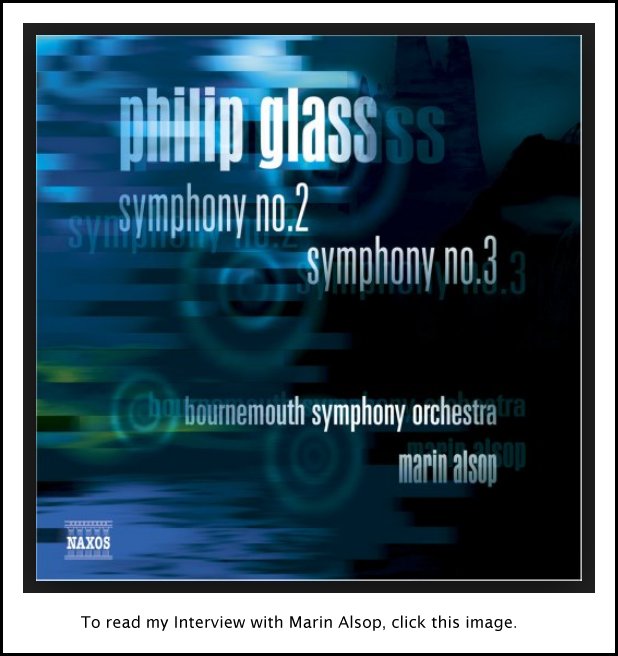 PG: No, I don’t usually work that way.
Ideas do turn up all over the place, so you work on one piece and like something
it stays with you. For days I was playing through The Representative recently because I
was about to have the piano-vocal score reproduced, and I wanted to check
and make sure I had all the words right. During that time I realized
that there were elements in it that were in Songs From Liquid Days. I said to
myself, “Oh, my goodness! I took that and I put it there.” Either
I had forgotten or hadn’t noticed — not that everyone
would notice that; it’s not a theme, exactly. It’s a certain treatment
of harmonic material that had come up in both pieces, so that does happen.
But I can’t say that I was so aware of it at the time.
PG: No, I don’t usually work that way.
Ideas do turn up all over the place, so you work on one piece and like something
it stays with you. For days I was playing through The Representative recently because I
was about to have the piano-vocal score reproduced, and I wanted to check
and make sure I had all the words right. During that time I realized
that there were elements in it that were in Songs From Liquid Days. I said to
myself, “Oh, my goodness! I took that and I put it there.” Either
I had forgotten or hadn’t noticed — not that everyone
would notice that; it’s not a theme, exactly. It’s a certain treatment
of harmonic material that had come up in both pieces, so that does happen.
But I can’t say that I was so aware of it at the time.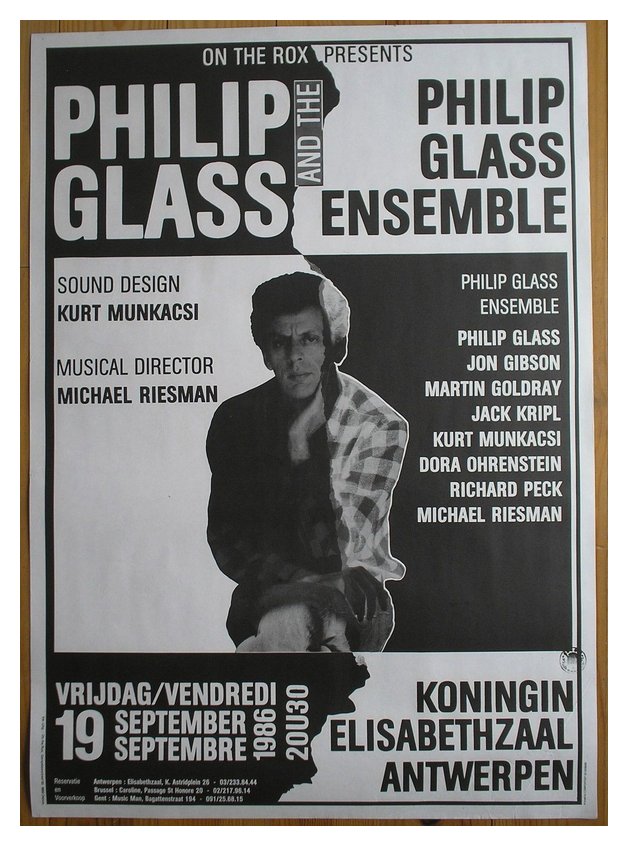 PG: You know, in a way, I’m a little bit [mumbles
a bit of wordless exasperation] about it in a certain way, though that may
sound surprising. I do a lot of concerts and I talk to a lot of people,
but I don’t see myself the way the world sees me. I see much more of
a continuity between myself and the person that began with an ensemble in
1968 doing six or eight concerts a year for a handful of people. I experience
my life as a continuity in that way, so it creeps up on you, in a way.
For example, on my schedule this year I can’t help but notice that I’m in
a lot of different countries, going to a lot of different openings of a lot
of different operas. Obviously, something has happened. I don’t
have as much time as I used to.
PG: You know, in a way, I’m a little bit [mumbles
a bit of wordless exasperation] about it in a certain way, though that may
sound surprising. I do a lot of concerts and I talk to a lot of people,
but I don’t see myself the way the world sees me. I see much more of
a continuity between myself and the person that began with an ensemble in
1968 doing six or eight concerts a year for a handful of people. I experience
my life as a continuity in that way, so it creeps up on you, in a way.
For example, on my schedule this year I can’t help but notice that I’m in
a lot of different countries, going to a lot of different openings of a lot
of different operas. Obviously, something has happened. I don’t
have as much time as I used to.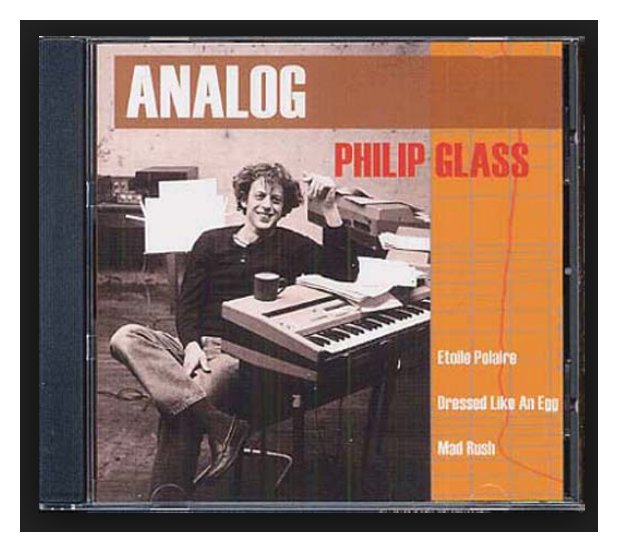 PG: The differences aren’t as great as we imagine.
Most of my friends stayed up that night to watch me on Saturday Night Live,
and that wasn’t the first night they had watched it. Most of my friends
watch it all the time, anyway. So the difference between a high culture
and a general public is sometimes the same people and how they feel at a
different time of the day. The differences are not that great.
I have friends who have a hard time if they have to choose between Twyla
Tharp and going to a Mets baseball game. They don’t know which one
to go to, and they’ll somehow try to do them both. So our loyalties
are less defined. We as a people experience our culture in a lot of
different ways. We define ourselves less rigidly than we used to.
PG: The differences aren’t as great as we imagine.
Most of my friends stayed up that night to watch me on Saturday Night Live,
and that wasn’t the first night they had watched it. Most of my friends
watch it all the time, anyway. So the difference between a high culture
and a general public is sometimes the same people and how they feel at a
different time of the day. The differences are not that great.
I have friends who have a hard time if they have to choose between Twyla
Tharp and going to a Mets baseball game. They don’t know which one
to go to, and they’ll somehow try to do them both. So our loyalties
are less defined. We as a people experience our culture in a lot of
different ways. We define ourselves less rigidly than we used to.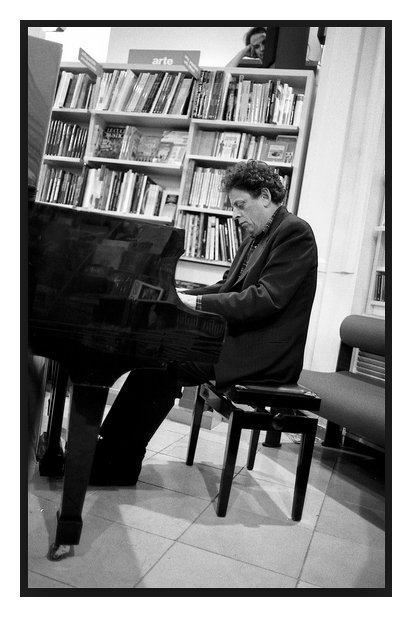 BD: It’s a different approach to concert giving.
BD: It’s a different approach to concert giving.© 1982 and 1987 Bruce Duffie
These conversations were recorded in Chicago. The first at the
University of Chicago on February 19, 1982, and the second at Lyric Opera
of Chicago on July 29, 1987. Portions were broadcast on WNIB twice in
1987 and again in 1997. Copies of the unedited audio of both have been
placed in the Archive of Contemporary Music
at Northwestern University.
This transcription was made in 2015, and posted on this website at that time.
To see a full list (with links) of interviews which have been transcribed and posted on this website, click here. To read my thoughts on editing these interviews for print, as well as a few other interesting observations, click here.
Award - winning broadcaster Bruce Duffie was with WNIB, Classical 97 in Chicago from 1975 until its final moment as a classical station in February of 2001. His interviews have also appeared in various magazines and journals since 1980, and he now continues his broadcast series on WNUR-FM, as well as on Contemporary Classical Internet Radio.
You are invited to visit his website for more information about his work, including selected transcripts of other interviews, plus a full list of his guests. He would also like to call your attention to the photos and information about his grandfather, who was a pioneer in the automotive field more than a century ago. You may also send him E-Mail with comments, questions and suggestions.